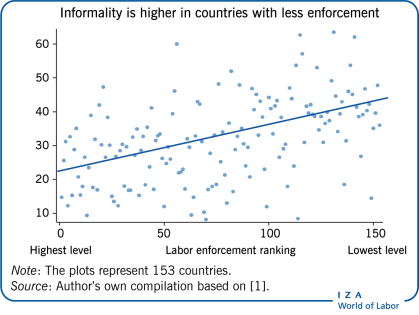Elevator pitch
More than half of private sector employees in the developing world do not receive legally mandated labor benefits. These regulations have typically been enacted by democratically elected governments, and are valued by both formal and informal workers. Increasing public enforcement (e.g. inspections, fines, and workers’ access to the judiciary) can be a powerful tool to reduce violations (e.g. increase the number of employees earning above the minimum wage). Which factors determine enforcement, and whether enforcement produces more social benefits than costs, are, however, unanswered questions.
Key findings
Pros
Enforcement reduces violations of labor regulations, improving the rule of law.
Workers who have access to legally mandated benefits are more likely to trust the state, and hence, to comply with their civic duties.
When labor regulations are adequate, enforcement can increase efficiency, thereby reducing market failures, leveling the playing field, reducing work-related injuries, and improving the income distribution.
Cons
Labor inspectors can be corrupted by lobby groups, particularly in countries that lack an autonomous civil service.
Enforcement can be politicized in countries that lack constraints on presidential power, serving as a tool to reward political allies and punish enemies.
When labor regulations are inadequate, enforcement can destroy productive employment and investment, particularly among low-skilled workers in small firms.
